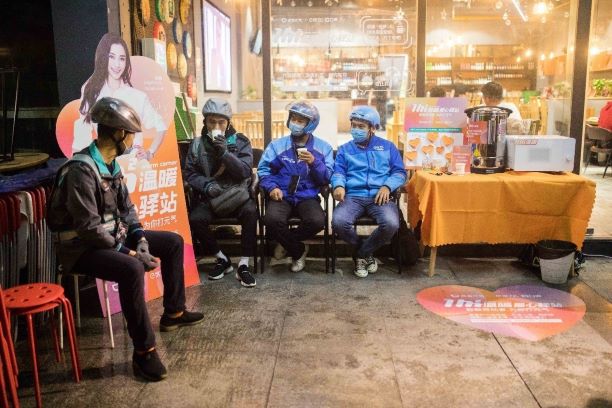Deliverymen rush on to pursue dreams in Chinese cities
By Yao Xueqing, People’s Daily
Restaurants in Hangzhou, east China’s Zhejiang province provide free hot water, cell phone chargers and space to rest for couriers and deliverymen. (By Xu Kangping, People’s Daily Online)
A video of a food deliveryman studying by the street under a street lamp in Nanning, southwest China’s Guangxi Zhuang Autonomous Region went viral in March, impressing many.
“I was preparing for an examination for Associate Constructor’s Certification as I had 15 minutes before the caterer handed me the food,” said Qin Liubei, the deliveryman in the video, who comes from Huanjiang Maonan Autonomous County, Guangxi.
Qin graduated from a vocational school three years ago, but hit a wall on the job market because of his plain professional skills. Therefore, he decided to take this job first but keep on learning skills.
He told People’s Daily that his family always encouraged him to keep studying, and he didn’t want to let them down.
At present, there are over 7 million people working for Meituan Dianping and Ele.me, two major online food delivery platforms in China, and many of them come from rural areas.
The flexible working hours is a major reason for many to become food deliverymen.
Statistics indicated that 59 percent of the deliverymen on Meituan Dianping work less than four hours each day, and 56 percent have other jobs, 26 percent of whom run small businesses. While delivering food to gain extra money, they are also striving to pursue their life dreams.
However, for some other deliverymen, delivering food is a career.
Liu Houxiang, a 42-year-old deliveryman working for Ele.me in Nanjing, east China’s Jiangsu province, set a record on the platform by delivering 6,465 late night orders in seven months.
“I have done the job for five years and gained some experience,” said Liu, sharing his experience that it’s better to take the orders with similar destinations and manage the schedule according to the time when meals are prepared.
Liu usually drives a motorcycle to deliver meals from 10 p.m. to the wee hours, when Nanjing is in its quietest time. Every day he takes orders placed by people off their night shift in the late night, Liu said, adding that they are just like old friends to him.
In February, the Ministry of Human Resources and Social Security, the State Administration for Market Regulation and the National Bureau of Statistics issued new professions and included food delivery as a professional job under the protection and regulation of national occupational classification system.
Besides, cities and platforms in China have also taken measures to regulate and protect the work of food delivery.
Beijing established an alliance for food deliverymen and couriers, and Xiamen, in southeast China’s Fujian province, introduced policies concerning the labor relations of food delivery service providers.
Online platforms have not only rolled out courses to help practitioners improve their professional skills and provide guidance on their career development, but also offered assistance for those from poor households.
Meituan Dianping plans to add 50,000 delivery jobs in poverty-stricken counties this year and offer them interest-free loans, said Xu Chen, head of the company’s branch in east China’s Jiangxi province.
As an important part of the Internet+ service, millions of deliverymen are gradually becoming a bond connecting people and satisfying daily demands. What their delivery boxes carry are not only people’s pursuit for and expectation of a more convenient lifestyle, but also their dream for a better life.













